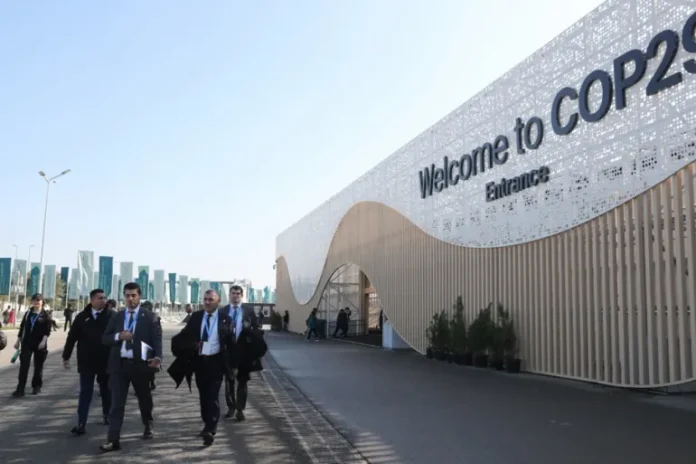The twenty-ninth session of the Conference of the Parties to the UN Framework Convention on Climate Change (COP29) starts on Monday in Baku.
COP29, which will be held in November 11-22 at the Baku Stadium, will be Azerbaijan’s largest event to date and is being held in the republic for the first time in the region. The session will include a summit of world leaders on climate action on November 12-13.
The main expectation from COP29 is to agree a fair and ambitious New Collective Quantitative Goal (NCQG) for climate finance.
At the initiative of the COP29 chairmanship, 14 tracks have been put forward covering the linkages between climate action and the Sustainable Development Goals. These include green energy corridors, green energy storage, sustainable development in the face of climate change, clean hydrogen, reducing methane emissions in organic waste, green digital technologies and other topics. In addition, there are plans to establish a Climate Finance Action Fund.
Establishing climate finance mechanisms is a top priority to bring the global community together and contribute to the goal of keeping global warming within 1.5°C.
About 80 thousand foreign guests will arrive at COP29, more than 50 heads of state and government have confirmed their participation in this large-scale event.
Earlier, Anar Alakbarov, member of the COP29 Organising Committee, Assistant to the President of Azerbaijan, said that 67,000 people have registered to participate in the event, and 85% of 17,500 hotel rooms have already been sold.
The year 2024 has been declared the “Year of Solidarity for a Green World” in the Republic of Azerbaijan. Azerbaijan plans to reduce greenhouse gas emissions by 35 per cent by 2030 and by 40 per cent by 2050 compared to the baseline year of 1990.
Gas and oil dependence
Azerbaijan’s economy is among the most dependent on oil and gas, trade in which, according to the UN, generates almost 60 per cent of the country’s income. Azerbaijani President Ilham Aliyev once described the country’s wealth of natural resources as “God’s gift,” even the capital Baku itself is located on an oil field.
Conference president Mukhtar Babayev worked for many years at the state oil company SOCAR. However, the summit organisers say Azerbaijan’s connection to fossil fuels should not be a cause for concern for anyone. Samir Bezhanov, the conference’s deputy lead speaker, said:
“Our approach and starting point is that we are all included, ready to contribute to global climate action. That was the basis for our proposal to adopt COP29. Yes, we are an oil and gas supplier country. We are not trying to silence our history. But if you look at what we are doing in terms of renewable energy, it is clear that Azerbaijan has plans to invest billions in related initiatives.”
Critics noted that the country plans to increase natural gas exports, including to Europe. Bezhanov said additional investment in the sector is justified, given the military conflict in Ukraine and growing demand from European consumers.
Criticism over fossil fuel production
Baku is not the first time the oil-producing state has hosted COP. Last year the event was held in the UAE and next year it is scheduled to be held in Brazil, a new member of the OPEC organisation of oil exporting countries. Shady Khalil, senior global policy strategist at clean energy research and outreach group Oil Change International, said:
“It is clear that Azerbaijan’s plans to further increase fossil fuel production are incompatible with the commitments Baku has made. The country has promised to set an example by working with its Troika colleagues (the UAE and Brazil) to try to comply with a 1.5 degree Celsius trajectory in its NDC (nationally determined contribution).”
According to the expert, Azerbaijan, Brazil and the UAE plan to increase oil and gas production by 32 per cent by 2035. Khalil also added:
“It’s hard to call this initiative action by countries credible on climate change.”
Global climate change issues
The UN climate change conferences remain the only international platform for centralised discussion of global climate change issues. They are held annually on a rotating basis in a country belonging to one of the five UN regional groupings (African, Asia-Pacific, Eastern European, Latin American and Caribbean, Western European and other states).
These events are formal sessions of the Conference of the Parties to the United Nations Framework Convention on Climate Change (UNFCCC), the Conference of the Parties serving as the Meeting of the Parties to the Kyoto Protocol, and the Conference of the Parties serving as the Meeting of the Parties to the Paris Agreement. A final document is signed at the end of each conference. The conference secretariat is headquartered in Bonn, Germany, where the UN campus is located.
